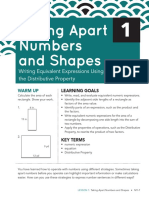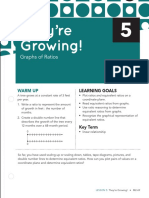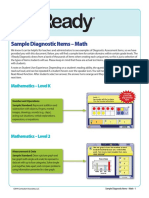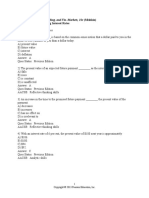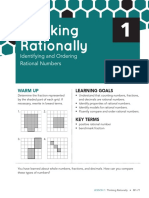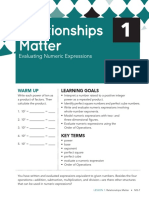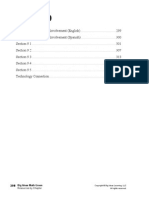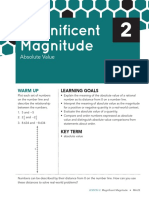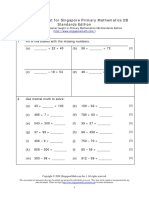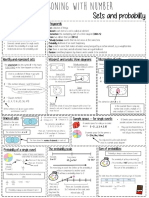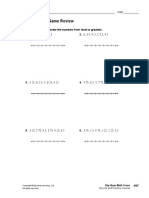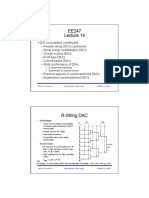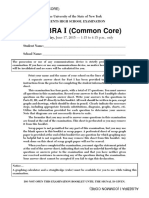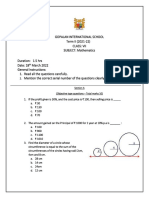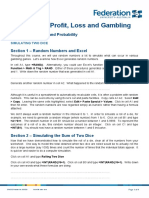Percents2 Warming The Bench CL Se
Percents2 Warming The Bench CL Se
Uploaded by
api-261894355Original Description:
Original Title
Copyright
Available Formats
Share this document
Did you find this document useful?
Is this content inappropriate?
Copyright:
Available Formats
Percents2 Warming The Bench CL Se
Percents2 Warming The Bench CL Se
Uploaded by
api-261894355Copyright:
Available Formats
Warming 2
the Bench
Using Estimation and Benchmark Percents
WARM UP LEARNING GOALS
Compute each product. • Order fractions, decimals, and percents.
• Estimate the percent of a quantity shaded in a model.
1 3 350
1. ___
10 • Use benchmark percents to calculate common percents
1 3 350 of quantities.
2. ____
100 • Estimate percents using benchmarks.
1 3 670
3. ___
10
1 3 670
KEY TERM
4. ____ • benchmark percents
100
You have used reasoning to calculate areas, volumes, decimal and fractional values, and
equivalent ratios. How can reasoning be used to solve percent problems?
LESSON 2: Warming the Bench • M2-123
Getting Started
Putting It All in Perspective
In your opinion, what does each famous quotation or saying
really mean?
1. “Genius is one percent inspiration and ninety-nine percent
perspiration.”
-Thomas Edison
2. “Success is 99 percent failure.”
-Soichiro Honda
3. “You miss 100 percent of the shots you never take.”
-Wayne Gretzky
4. "Always give 110%. It's the extra 10% that everyone
remembers."
-Frank Sonnenberg
M2-124 • TOPIC 2: Percents
AC T I V I T Y
Ordering Fractions,
2.1 Decimals, and Percents
Each student has been given a note card that contains a number
Think about all of
expressed as a fraction, decimal, or percent.
the different ways to
express your number.
As a class, order the set of numbers from least to greatest.
1. Explain the strategies used by your class to order the numbers.
Noah and Dylan were assigned the numbers 0.0¯ 6 and 0.1% but
they disagreed on which was larger. Noah says that 0.0¯ 6 is less
¯
than 0.1, so 0.06 is less than 0.1%. Dylan says that since 0.1%
is the same as as 0.001 and 0.001 is less than 0.0¯6, 0.1% is less
¯
than 0.06.
2. Who is correct? Explain your reasoning.
3. Order the numbers from least to greatest.
1 , ___
0.99, __ 3 , 70%, 4.3%, 0.81, 0.64
17 , 95%, 25%, __
9 20 8
LESSON 2: Warming the Bench • M2-125
AC T I V I T Y
Estimating Percents from
2.2 Pictures
You know that 100% means one, or the whole, and 50% means half.
You can estimate a lot of percents when using a visual model.
A laptop computer uses an icon of a battery on the toolbar to show
how much power is left in the battery. When you glance at the icon,
you can get a good estimate of how much battery life remains before
you need to recharge the battery.
1. Estimate how much battery power remains by writing the
percent under each battery icon.
a. b. c.
Are your
estimates
the same
as your
partner's? d. e. f.
2. Estimate the shaded part of each circle shown, and write it as
a percent.
a. b. c.
M2-126 • TOPIC 2: Percents
d. e. f.
3. Estimate the shaded part of each model, and write it as
a fraction, a decimal, and a percent. Write the fraction in
lowest terms.
a. b.
c. d.
Can I determine
the percent
shown if the
shading isn't all
together and the
parts are not all
e. f. the same size?
4. Describe the strategies that you used to make
your estimations.
LESSON 2: Warming the Bench • M2-127
AC T I V I T Y
2.3 Benchmark Percents
A benchmark percent is a percent that is commonly used, such as
1%, 5%, 10%, 25%, 50%, and 100%. With fractions and decimals,
benchmarks can be used to make estimations. With percents,
however, you can use benchmarks to calculate any whole percent
of a number.
100%
50% 50%
25% 25% 25% 25%
Remember,
you worked 20% 20% 20% 20% 20%
with the
benchmark
fractions of 10% 10% 10% 10% 10% 10% 10% 10% 10% 10%
1, and 1.
__
0, 2
1. Use the tape diagram to state each relationship.
a. How is 50% related to 100%?
b. How is 25% related to 100%? How is 25% related to 50%?
c. How is 10% related to 100%? How is 10% related to 50%?
M2-128 • TOPIC 2: Percents
2. Continue the pattern from the tape diagram to state
Remember that
each relationship.
1% = 0.01.
a. How is 5% related to 10%?
b. How is 1% related to 10%? How is 1% related to 5%?
3. Use the benchmark percents to determine each value
if 600 is 100%.
a. 50% b. 25%
c. 10% d. 5% e. 1%
LESSON 2: Warming the Bench • M2-129
4. Use your calculator to determine the percent of each number.
a. 1% of 28 5 b. 10% of 28 5
c. 1% of 234 5 d. 10% of 234 5
e. 1% of 0.85 5 f. 10% of 0.85 5
g. 1% of 5.86 5 h. 10% of 5.86 5
i. 1% of 98.72 5 j. 10% of 98.72 5
k. 1% of 1085.2 5 l. 10% of 1085.2 5
M2-130 • TOPIC 2: Percents
5. What patterns do you notice in your answers in Question 4?
NOTES
6. Write a rule to calculate 1% of any number.
7. Write a rule to calculate 10% of any number.
8. Use the patterns you recognized in Question 4 to calculate
each value.
a. 10% of 45.21 b. 1% of 45.21
c. 10% of 0.72 d. 1% of 0.72
e. 10% of 2854 f. 1% of 2854
LESSON 2: Warming the Bench • M2-131
AC T I V I T Y
Determining Percents using
2.4 Benchmarks
Deciding how much tip to leave a server at a restaurant is one way
that percents are used in the real world.
Akuro eats at the Eat and Talk Restaurant and decides to leave a 15%
tip. Akuro says, “I can easily calculate 10% of any number, and then
calculate half of that, which is equal to 5%. I can then add those two
percent values together to get a sum of 15%.”
1. Is Akuro’s method reasonable?
2. How much should he leave for a tip of 15% on $16.00?
3. What is 15% of each restaurant check total given? Explain
how you calculated your answer. Round to the nearest
hundredth if necessary.
a. $24.00 b. $32.56 c. $47.00
You can determine any whole percent of a number by using 10%, 5%,
and 1%.
4. How can you use 10%, 5%, and/or 1% to determine each
percent given? Explain your reasoning.
a. 18% b. 25% c. 37%
M2-132 • TOPIC 2: Percents
5. Calculate each value using 1%, 5%, and 10%.
a. 27% of 84 b. 43% of 116
c. 98% of 389 d. 77% of 1400
e. 12% of 1248
6. About 12% of the United States population is left-handed.
Use this estimate to determine about how many left-handed
students there would be for each class of the given size.
a. 150 students
So, if 12 percent
of the U.S.
population is
left-handed,
b. 200 students what percent of
the population is
right-handed or
"both"-handed?
c. 375 students
LESSON 2: Warming the Bench • M2-133
NOTES
TALK the TALK
Brain Weights
A chimpanzee’s brain weight can be compared to the brain
weight of other mammals. Assume that the weight of an average
chimpanzee’s brain is 400 grams. The table provides the average
brain weight of various mammals as a percent of a chimp’s
brain weight.
Lion Sheep Cat Rabbit Human Bear
Average
Brain
Weight as a
60% 35% 7% 2.5% 350% 119%
Percentage
of a Chimp’s
Brain Weight
Average
Brain Weight
(grams)
1. Order from least to greatest the brain weights of the
mammals in the table, along with the chimpanzee, based
on percents.
2. Use benchmarks to determine the average brain weights
for each animal. Show all of your work.
3. Does the order of the percents match the order of the
brain weights? Why or why not?
M2-134 • TOPIC 2: Percents
Assignment
Write Remember
Explain how to use benchmark Benchmarks percents—1%, 5%, 10%, 25%, 50%, and 100%—can
percents to order and estimate be used to perform mental estimation and calculation of percents.
the value of other percents. Values of benchmark percents can be added and subtracted to
calculate the value of other percents.
Practice
The students at Penncrest Middle School sold various products for a fall fundraiser. The table shows the
percent of profit the school earned and the total amount sold for each type of product.
Product Percent Profit Amount Sold
Candy 65% $6400
Wrapping paper 40% $1200
Stationery 50% $900
Calendars 25% $3120
1. Use benchmark percents to calculate the amount of profit the school earned on the sale of each product.
a. Candy
b. Wrapping paper
c. Stationary
d. Calendars
2. Suppose that the students also sold $4500 worth of pens and pencils, which earned a 42% profit.
Calculate the profit the school earned on pens and pencils.
LESSON 2: Warming the Bench • M2-135
Stretch
Assume the weight of an average chimpanzee’s brain is 400 grams. If the average hedgehog’s brain
weight is 0.8% of a chimp’s brain weight, use benchmark percents to determine the average weight of a
hedgehog’s brain.
Review
1. Complete the table. Write each as a fraction, decimal, and percent.
Fraction Decimal Percent
3%
1.5
13
___
20
2
__
3
2. Miss Jenn is the teacher of a preschool class at Kids Unlimited Daycare. She must split the children’s time
between playing and learning. For every 30 minutes, the children will spend 18 minutes playing and
12 minutes learning. Complete the table of equivalent ratios.
Total amount of time 30 90
Playing time 18 144
Learning time 12 48
3. Use the standard algorithm to determine each quotient.
a. 8302 4 28 b. 39.13 4 4.3
M2-136 • TOPIC
LESSON2: 1:
Percents
A Trip to the Moon
You might also like
- SystemVerilogAssertionHandbook FullDocument361 pagesSystemVerilogAssertionHandbook FullAjay Gunji100% (1)
- PDF Roarks Formulas For Stress and Strain 9Th Ed 9Th Edition Richard Budynas Ebook Full ChapterDocument53 pagesPDF Roarks Formulas For Stress and Strain 9Th Ed 9Th Edition Richard Budynas Ebook Full Chapterjanice.leonard482100% (2)
- Lesson 2 Bar None Equations UnitDocument12 pagesLesson 2 Bar None Equations Unitapi-261894355Noch keine Bewertungen
- Lesson 2 Bar None Equations UnitDocument12 pagesLesson 2 Bar None Equations Unitapi-261894355Noch keine Bewertungen
- MathDocument184 pagesMathZachary Schuster100% (1)
- Taking Apart Numbers and ShapesDocument8 pagesTaking Apart Numbers and Shapesapi-261894355Noch keine Bewertungen
- Geometry ReviewDocument26 pagesGeometry ReviewRocket Fire100% (1)
- Lesson 1 First Among Equals Equations UnitDocument20 pagesLesson 1 First Among Equals Equations Unitapi-2618943550% (1)
- Error AnalysisDocument36 pagesError AnalysisAdamNoch keine Bewertungen
- c01 Se m01 t01 l04Document12 pagesc01 Se m01 t01 l04api-261894355Noch keine Bewertungen
- Lesson 5 Theyre GrowingDocument16 pagesLesson 5 Theyre Growingapi-261894355Noch keine Bewertungen
- Coordinate Plane l2 Its A Bird Its A Plane SeDocument14 pagesCoordinate Plane l2 Its A Bird Its A Plane Seapi-261894355Noch keine Bewertungen
- Unitrates1 Manywaystomeasure CL SeDocument20 pagesUnitrates1 Manywaystomeasure CL Seapi-261894355Noch keine Bewertungen
- Topic 1 Ratios Full Student VersionDocument102 pagesTopic 1 Ratios Full Student Versionapi-261894355Noch keine Bewertungen
- Iready Sample Diagnostic Items MathDocument4 pagesIready Sample Diagnostic Items Mathapi-379755793Noch keine Bewertungen
- Red Big Ideas Math Tutorial VideosDocument10 pagesRed Big Ideas Math Tutorial Videosapi-472819273Noch keine Bewertungen
- 4th Grade Math Expressions Unit OverviewDocument3 pages4th Grade Math Expressions Unit Overviewapi-294319197100% (1)
- Math g8 m7 Mid Module AssessmentDocument20 pagesMath g8 m7 Mid Module AssessmentEloiza GNilo100% (1)
- Unit TestDocument2 pagesUnit Testapi-269787508Noch keine Bewertungen
- Lesson 3 Play It in Reverse Equations UnitDocument16 pagesLesson 3 Play It in Reverse Equations Unitapi-261894355Noch keine Bewertungen
- Coordinate Plane l2 Its A Bird Its A Plane SeDocument14 pagesCoordinate Plane l2 Its A Bird Its A Plane Seapi-261894355Noch keine Bewertungen
- Chapter 4 Test Bank PDFDocument23 pagesChapter 4 Test Bank PDFCharmaine Cruz100% (4)
- Master Fracions Addition, Subtraction And MultiplicationFrom EverandMaster Fracions Addition, Subtraction And MultiplicationNoch keine Bewertungen
- Lesson 1 Thinking Rationally CL SeDocument12 pagesLesson 1 Thinking Rationally CL Seapi-261894355Noch keine Bewertungen
- CL Relationships Matter SeDocument16 pagesCL Relationships Matter Seapi-261894355Noch keine Bewertungen
- Chapter 1Document41 pagesChapter 1api-268597715Noch keine Bewertungen
- Chapter 9Document34 pagesChapter 9api-268597715Noch keine Bewertungen
- Chapter 10Document30 pagesChapter 10api-268597715Noch keine Bewertungen
- Integer Review Notes1.9.12keyDocument1 pageInteger Review Notes1.9.12keyLaTrease TurlingtonNoch keine Bewertungen
- Ta Taking Apart Numbers and ShapesDocument16 pagesTa Taking Apart Numbers and Shapesapi-261894355Noch keine Bewertungen
- Magnificent Magnitude SeDocument12 pagesMagnificent Magnitude Seapi-261894355Noch keine Bewertungen
- Lesson 4 Getting Real Equations UnitDocument10 pagesLesson 4 Getting Real Equations Unitapi-2618943550% (1)
- Maths Question Bank Donimalai Sa 1Document102 pagesMaths Question Bank Donimalai Sa 1abc100% (1)
- G5 Add and Sub of Decimals Worksheets USADocument12 pagesG5 Add and Sub of Decimals Worksheets USAKristen Cate TagudinNoch keine Bewertungen
- Rekenre PDFDocument46 pagesRekenre PDFNachammai ShanmugamNoch keine Bewertungen
- Lesson 2.5 - Subtracting IntegersDocument25 pagesLesson 2.5 - Subtracting IntegersehystadNoch keine Bewertungen
- 1st QTR WkshtsDocument30 pages1st QTR Wkshtsapi-316781445Noch keine Bewertungen
- The Distributive Property NotesDocument8 pagesThe Distributive Property Notesapi-310102170Noch keine Bewertungen
- Decimals: Place Value Fractions To Decimals Key VocabularyDocument2 pagesDecimals: Place Value Fractions To Decimals Key VocabularyPeterMarthinNoch keine Bewertungen
- Test Correction FormDocument2 pagesTest Correction Formapi-94370423Noch keine Bewertungen
- Iready Expressions and Equations TeDocument4 pagesIready Expressions and Equations Teapi-261894355Noch keine Bewertungen
- Multiplication and Division Using Units of 4: Mathematics CurriculumDocument2 pagesMultiplication and Division Using Units of 4: Mathematics CurriculumAkiraNoch keine Bewertungen
- Assessment Test For Singapore Primary Mathematics 2B Standards EditionDocument9 pagesAssessment Test For Singapore Primary Mathematics 2B Standards EditionPhen OrenNoch keine Bewertungen
- Unit 14 Sets and Probability KODocument1 pageUnit 14 Sets and Probability KOOLIVEEN WILKS-SCOTTNoch keine Bewertungen
- K 21 FoundationsForAlgebra 0 PDFDocument44 pagesK 21 FoundationsForAlgebra 0 PDFJenna MillerNoch keine Bewertungen
- 3rd Grade Math and ELA FocusDocument18 pages3rd Grade Math and ELA FocusLAUSDCCSSNoch keine Bewertungen
- Chapter 5Document46 pagesChapter 5api-268597715Noch keine Bewertungen
- Place Value of A 3-Digit NumbersDocument19 pagesPlace Value of A 3-Digit Numbersostance yeongNoch keine Bewertungen
- Lakehurst Middle School Summer Math Packet: End-of-Course TestDocument4 pagesLakehurst Middle School Summer Math Packet: End-of-Course TestTony LeeNoch keine Bewertungen
- Grade 2 Math Practice CardsDocument3 pagesGrade 2 Math Practice CardsMauriceNoch keine Bewertungen
- Hadley Grade 8 Workbook 2008-2009 Modified Sept 25 08Document206 pagesHadley Grade 8 Workbook 2008-2009 Modified Sept 25 08J'Niya Byrd Student - FuquayVarinaHSNoch keine Bewertungen
- 92011024.F Data StudentDocument32 pages92011024.F Data StudentJody HeydonNoch keine Bewertungen
- Fractions, Decimals and Percentages - Student BookDocument36 pagesFractions, Decimals and Percentages - Student BookAdrián CastilloNoch keine Bewertungen
- Add and Subtract Fractions With Unlike Denominators 7 +Document5 pagesAdd and Subtract Fractions With Unlike Denominators 7 +Priyanka JawaherNoch keine Bewertungen
- Menu Math ProjectDocument2 pagesMenu Math Projectapi-3394620590% (1)
- Grade 4 Parent BrochureDocument2 pagesGrade 4 Parent Brochureapi-261342302Noch keine Bewertungen
- Unit Rates and Ratios of Fractions Quiz 1Document2 pagesUnit Rates and Ratios of Fractions Quiz 1api-26189435550% (2)
- Te ch01Document104 pagesTe ch01deez IINoch keine Bewertungen
- W Word P Ord Problems Roblems Made Easy Made EasyDocument50 pagesW Word P Ord Problems Roblems Made Easy Made Easyrolfanuj nayunajNoch keine Bewertungen
- CH 9 - Record and Practice JournalDocument22 pagesCH 9 - Record and Practice JournalspidersNoch keine Bewertungen
- Unit 13 Number Sense KODocument1 pageUnit 13 Number Sense KOOLIVEEN WILKS-SCOTTNoch keine Bewertungen
- Introduction To EquationsDocument42 pagesIntroduction To EquationsDiegoNoch keine Bewertungen
- 95725647.G Chance StudentDocument14 pages95725647.G Chance StudentJody HeydonNoch keine Bewertungen
- Zearn Notebook Mission 6Document58 pagesZearn Notebook Mission 6api-292443995100% (1)
- Guided Notes and PracticeDocument3 pagesGuided Notes and Practiceapi-302577842Noch keine Bewertungen
- Math Homework Module8Document17 pagesMath Homework Module8Valerie Yenshaw100% (1)
- Algebraic Sudoku Bk 2: A Fun Way to Develop, Enhance, and Review Students’ Algebraic SkillsFrom EverandAlgebraic Sudoku Bk 2: A Fun Way to Develop, Enhance, and Review Students’ Algebraic SkillsNoch keine Bewertungen
- Lesson 4 Getting Real Equations UnitDocument10 pagesLesson 4 Getting Real Equations Unitapi-2618943550% (1)
- Bias and Variance in Machine Learning - JavatpointDocument6 pagesBias and Variance in Machine Learning - JavatpointFriendlyarmMini100% (2)
- Sem VI-CDO-302 - MRU - Aptitude HandbookDocument52 pagesSem VI-CDO-302 - MRU - Aptitude HandbookDeepakNoch keine Bewertungen
- LESSON EXEMPLAR COT1 Objective 2Document5 pagesLESSON EXEMPLAR COT1 Objective 2Zaldy Roman MendozaNoch keine Bewertungen
- m2 Arithmetic SequenceDocument9 pagesm2 Arithmetic Sequenceedmund roseteNoch keine Bewertungen
- Modifying Line Types in Autocad - ACADDocument3 pagesModifying Line Types in Autocad - ACADjefe7yuNoch keine Bewertungen
- Physics Report, Period of A PendulumDocument6 pagesPhysics Report, Period of A PendulumJoshua HardieNoch keine Bewertungen
- Errors and Approximations PDFDocument2 pagesErrors and Approximations PDFMelissaNoch keine Bewertungen
- Dotnet Lab RecordDocument55 pagesDotnet Lab RecordCaroline HoldenNoch keine Bewertungen
- Ebook NSW Y12 Mastering IntegrationDocument51 pagesEbook NSW Y12 Mastering IntegrationNathan HaNoch keine Bewertungen
- First Order RC High Pass Filter: ObjectivesDocument4 pagesFirst Order RC High Pass Filter: ObjectivesismailNoch keine Bewertungen
- Suffix Trees in DetailDocument23 pagesSuffix Trees in DetailrashidNoch keine Bewertungen
- D/A Converters Continued:: - Component Matching - Systematic & Random ErrorsDocument31 pagesD/A Converters Continued:: - Component Matching - Systematic & Random ErrorsAvinash BadanikaiNoch keine Bewertungen
- MathsDocument4 pagesMathsSuyash AgrawalNoch keine Bewertungen
- 0615 Exam AIDocument126 pages0615 Exam AIJulia Garcia-LascurainNoch keine Bewertungen
- 2122 (c2c) HB All 250 Problems No Solutions - 090921Document42 pages2122 (c2c) HB All 250 Problems No Solutions - 090921john100% (1)
- Introduction To Engineering: International University of Science & TechnologyDocument45 pagesIntroduction To Engineering: International University of Science & Technologyabd alkaderNoch keine Bewertungen
- Bba-Ds-104 CF TheoryDocument2 pagesBba-Ds-104 CF TheoryShilpa BhatiaNoch keine Bewertungen
- Q2 - G8 MathDocument11 pagesQ2 - G8 MathJiryl AlpuertoNoch keine Bewertungen
- Javascript Crock FordDocument164 pagesJavascript Crock FordRohit Kumar100% (1)
- Pse Module 11.1: Prime Review OnlineDocument2 pagesPse Module 11.1: Prime Review OnlineBenNoch keine Bewertungen
- Graph Theory Lecture Notes: Narayanan NDocument19 pagesGraph Theory Lecture Notes: Narayanan NmaruthamangalamNoch keine Bewertungen
- Lateral Pile Capacity PDFDocument33 pagesLateral Pile Capacity PDFAuliya Marfuatin NNoch keine Bewertungen
- Stacks Queues ListsDocument6 pagesStacks Queues ListsyuyiipNoch keine Bewertungen
- Introduction To Psychological Statistics (Foster Et Al.)Document226 pagesIntroduction To Psychological Statistics (Foster Et Al.)ncarab15Noch keine Bewertungen
- Grade 7 - Term 2 - Objective and Subjective - Ver 2.0Document6 pagesGrade 7 - Term 2 - Objective and Subjective - Ver 2.0Harshitha A.sNoch keine Bewertungen
- Application of Simple Harmonic MotionDocument6 pagesApplication of Simple Harmonic MotionNarayan VarmaNoch keine Bewertungen
- MATHS2003 Profit, Loss and Gambling: Lab Week 3 - Excel and ProbabilityDocument4 pagesMATHS2003 Profit, Loss and Gambling: Lab Week 3 - Excel and ProbabilityScott StuckeyNoch keine Bewertungen




